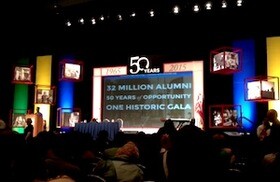
The Head Start program started in 1965, a key part of President Lyndon B. Johnson’s War on Poverty meant to help the nation’s youngest and poorest children thrive. Amid the constant pressure to show its relevance, the National Head Start Association gathers in Washington this week for its annual conference and to celebrate Head Start’s 50th anniversary.
Draping itself in Americana and can-do spirit, the NHSA conference kicked off Tuesday afternoon with choral performances of “Lean on Me,” “America the Beautiful,” and the national anthem. The grand ballroom of the Walter E. Washington Convention Center had been remodeled with large black-and-white photos of Head Start children.
There was little subtlety on display at the event, and a clear message: Head Start plans to keep standing against the challenges it has faced since its founding, including questions about long-term effectiveness and funding. The NHSA and the speakers it invited to its conference delivered that message with fire and passion.
Cornell Brooks, president and CEO of the NAACP, and a former Head Start student himself, drove home the civil rights legacy of Head Start.

“When we stand for education ... we stand for civil rights,” he said, tying the promise of Head Start to the threat of academic failure and the school-to-prison pipeline that disproportionately affects minority students. While white students make up a plurality of Head Start students, black students participate in disproportionate numbers.
More than 31 million children have entered Head Start since it began; the program offers social, educational, and health supports to young children and infants in low-income families.
“Life is a gift to be given to others in service,” Brooks said. “That is what Head Start is about. It is a gift to the next generation.”
U.S. Rep. Rosa DeLauro, D-Conn., an advocate for Head Start in Congress, told the audience to keep advocating for funding; Head Start lost 5 percent of its funding due to the across-the-board federal budget cuts known as sequestration in 2013.

“We hear you loud and clear on Capitol Hill,” she said. “But don’t dim your voices. Make them louder and clearer.”
Attendees also heard from Edward F. Zigler, who the speakers referred to as the “father of Head Start"; Zigler, director emeritus of Yale University’s Edward Zigler Center in Child Development and Social Policy, served on the original 1965 committee that crafted the program. He noted that Head Start isn’t meant to replace parents; it’s meant to support them. Zigler was also reunited on stage with the anesthesiologist from a surgery two years ago; that anesthesiologist, the son of two Cambodian refugees, had also been a Head Start participant.
Organizers estimate that 5,000 people are attending the convention, which runs until April 2. Most attendees work for Head Start, a few dozen are parents of Head Start children, and a smattering are former Head Start children themselves.
Images from top: Blocking foot traffic at the Walter E. Washington Convention Center; inside the grand ballroom. Credit: Ross Brenneman
Chart source: Head Start office
See also: